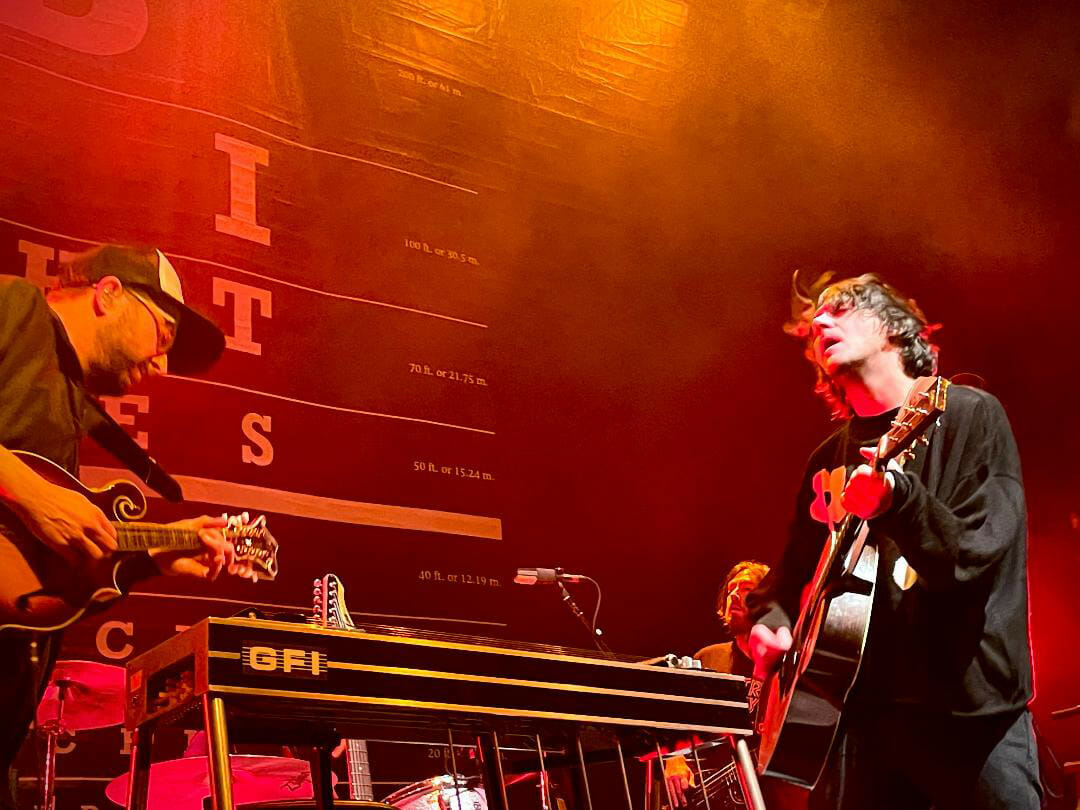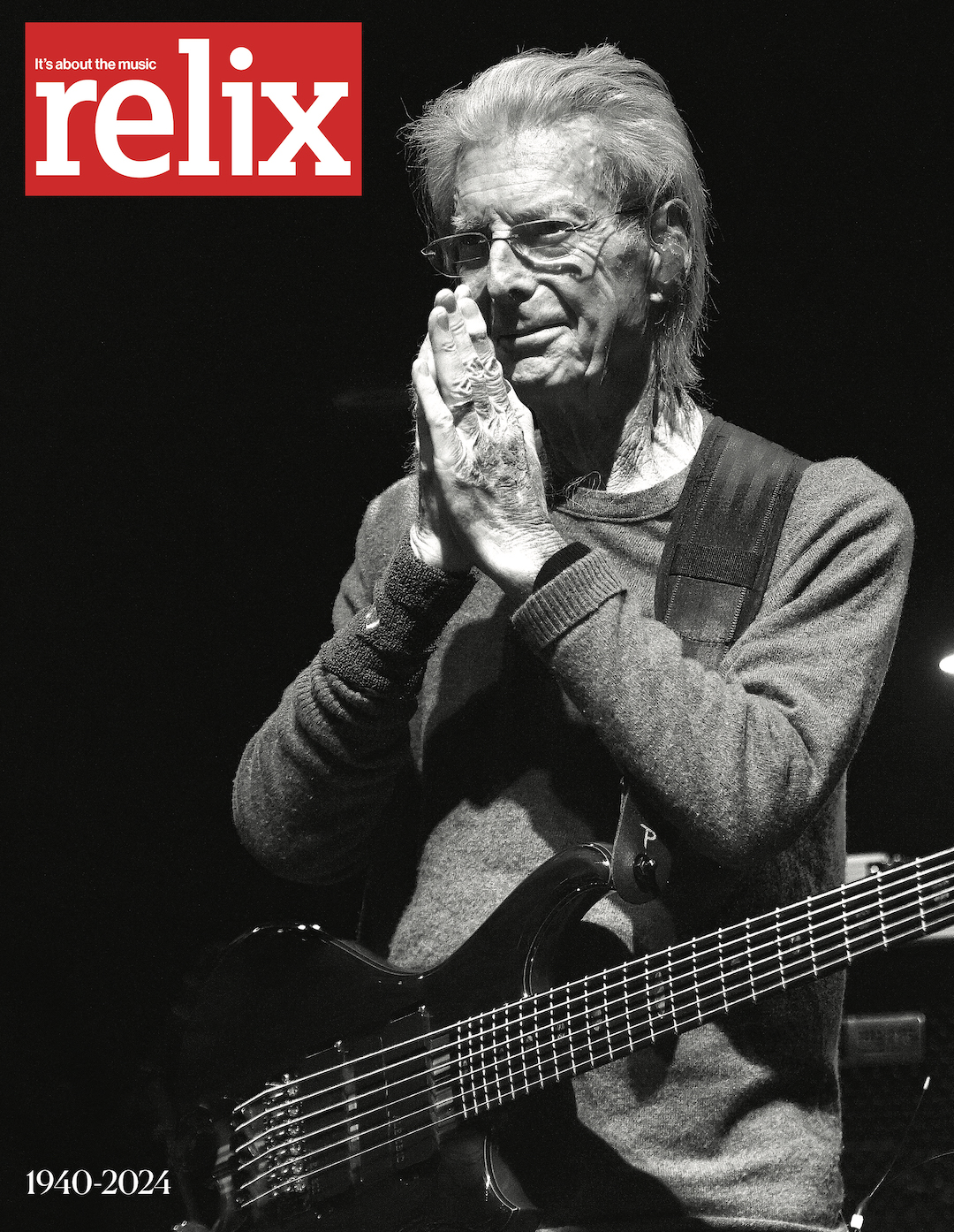Bright Eyes at The NorVa

After a decade hiatus, Bright Eyes, led by the ubiquitous Conor Oberst, has returned, embarking on a tour celebrating their rebirth and their latest album. Hitting Norfolk, Virginia in the early spring, Bright Eyes filled the stage of The NorVa with a mind-blowing array of musicians and instruments, including a chamber orchestra, a good fit for for the cosmic-to-intimate sounds of existential rockers Oberst and his original bandmates Mike Mogis and Nathaniel (Nate) Walcott. Oberst played electric and acoustic guitar and piano, while Mogis was a centerpiece on mandolin, guitar, and pedal steel and Walcott played keyboards. They played to an enthusiastic full house, many of whom sang along – loudly and with emphasis on key words – to favorite tunes, glad for the return of Bright Eyes and for live music after years of Pandemic.
Oberst began by saying, as if to himself, “I’m such degenerate. I don’t even know what day it is, adding to the crowd, “what day is it?” And, the audience answered “Sunday!” “Well,” he said, “Thanks for coming out on a Sunday!” This began a show-long ongoing talk with the crowd, with him ending the show later by telling audience members in a soulful voice that he loved them, “I loved playing for you guys. You’re one of the best audiences, love ya.” He would also step dramatically close to the front rows and sing directly to fans leaning forward in rapt attention.
The band was a diverse group of men and women players of varied racial and ethnic backgrounds performing on voice and instruments including acoustic and electric guitar, mandolin, pedal steel guitar, violins, cello, bass, multiple keyboards and drum sets, horns, saxophone, a piano, and clarinet, as well as electronics produced by Walcott. Together, these accomplished musicians performed a network of songs, each one becoming a movement in an evolving orchestra-like composition. Accordingly, the music would rise or lower as if part of an organic design meant both to enchant and to challenge. Underlying all this were Oberst’s inventive, mystifying, poetic, endearing, humorous, and moving lyrics, by one of the most original, engaging songwriters in contemporary music, though it was often hard to hear above the ambient crowd noise. Worth listening for though, the words were there, layered within the songs as well as being showcased in a few choice ballads, played with greater subtlety and acoustic quiet, including perhaps their best-known song “First Day of My Life” (“This is the first day of my life/Swear I was born right in the doorway … Yours was the first face that I saw/I think I was blind before I met you”), accentuated by the soulful flute of Domenica Fossati. The song was their first encore, a lovely tune that has had cross-over appeal and is known to a broader public often not aware of the source of the song. The crowd erupted on the opening chords, and it was rendered by the singer-songwriter as if directly from the writer’s heart to the audience.
The opening song, with the large band and with a massive drum thump keeping time, was electric. I touched the stage floor and could feel a cascade of sound rushing through the body directly to the bones.
With only a few appearances under their belts on the tour, the group showed no rust, with sophisticated arrangements executed briskly and on-point with both swing and sadness. Bright Eyes’ hiatus provided Oberst the chance to flex his creative muscles in new areas and projects, including a tour, with The Felice Brothers as his back-up band, highlighted by an appearance on the cave-based PBS TV program “Bluegrass Underground.” Other projects included: Better Oblivion Community Center, a group he formed with his oft-times collaborator Pheobe Bridgers, The Mystic Valley Band, and Monsters of Folk “superband” with Yim Yames (Jim James), of My Morning Jacket, M. Ward, Mike Mogis, and Will Johnson. In addition, Conor opened a bar, now a “trendy” hot spot, in an “artsy” neighborhood of Omaha, Nebraska. Oberst had come on to the indie scene as a 15-years-old in Omaha, having already written a prodigious number of songs. He, Mogis, and Walcott formed Bright Eyes shortly afterward, honing their chops in the Omaha indie music scene. He still moves through music and spoken word with the confident forward movement of a savant.
Songs ranged from early-catalog favorites to songs from their new album “Down in the Weeds, Where the World Once Was,” and some tunes reworked during the Pandemic for upcoming release. Oberst led the proceedings as he sang, played guitar and piano, and moved about the stage in a combination of rhythmic and sometimes anarchistic movements, flops, stomps, and waving gestures. He would also lean into the audience, resplendent in his floppy, black jersey dotted with large circles resembling egg whites (first outfit), to sing directly to the crowd while also interacting with his band, leaning into the players’ faces, appearing to take a long bite out of band mate Mike Mogis’ neck, all the while Mogis playing guitar as if nothing else was happening. The female clainet (et al) player then left her spot in the chorus to join Conor center stage where she began to dance (and then sing) with him. All the while the bandleader appeared held in a shamanistic intensity.
A special guest, for all tour dates, was rising indie star singer-songwriter Lucy Dacus, originally from the nearby Richmond, Virginia area and recently spotlighted on CBS TV Saturday Morning “Sessions,” Other musicians included Jon Theodore on drums, Macey Taylor, bass, and Miwi LaLupa, guitar and vocals.
Christian Lee Hutson opened the show as part of a trio doing largely acoustic numbers with dynamic drums and his own sensitive and well-made songs. Hutson grew up on Bright Eyes music and was part of Better Oblivion Conference Center with Oberst and Bridgers.
Throughout, the concert boasted intricate harmonies and melodies and Conor’s moving, humorous, and inventive lyrics, an addictive combination for listeners. The band’s appeal to young audiences was evidenced by the large percentage of young adult fans in attendance. Not surprisingly, Oberst’s words often echo the angst, sadness, and pressures of growing up as well as the joys and explorations of youth. His narratives however roam into his current middle age experience and feelings. And, none of his music’s appeal is restricted to the young. The songs’ experiences are not only the domain of youth but explore feelings and actions that continue in one form or another through lifetimes, both in the moment and in memory.
NPR Radio’s “World Beat” quotes Conor, as his fans lovingly call him, on the meaning of Bright Eyes’ recent album title (an album in part influenced by the recent death of Obest’s brother) “Down in the Weeds, Where the World Once Was”: “It’s about the minutiae of experience. If you get ‘down in the weeds,’ you’re paying too much attention to the little details. But I think that all those little details, that’s actually what makes up life. Those are the things that anyone that’s lost somebody – or even just lost love or lost a good friend – you don’t really think of it in broad strokes. You remember all the littlest things, and those are the things that pull at your heart; they’re the things that keep you up at night. Weeds are also the first thing that grows back up out of destruction. If you blow up a building, what happens next? In come the weeds, in comes the forest that grows over the destruction.”
Songs from that record included the lively “Dance and Sing” and the beautiful and moving “Calais to Dover,” as well as six others from the critically-acclaimed album, their first since 2012. The album, “The People’s Key” came in next with four songs played.
Conor was the spiritual guide, seeming almost in a terrestrial place, giving the audience glimpses into the world he inhabits and works so diligently to express. And, all of this came with a profound beat and a shared experience of joy you could often see in the faces and swinging movements of his players. Conor Oberst has said that he wants to give joy to his listeners, even in the saddest songs. He and his band mates proved true to his word throughout the set and in its three powerful encores.



















